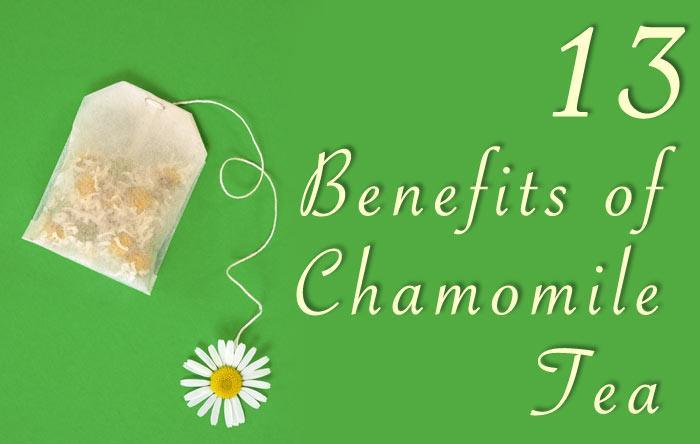Last Updated on August 31, 2023 by Marc Seward
What is Chamomile Tea Good For?
Soothing chamomile tea. This delicious tea will not only improve your overall sense of wellbeing as you drink it, but it also provides a wide array of health benefits as well. This mild tea is well known for treating stomach upset and sleeping disorders.
Chamomile tea can deliver much more than that. An herb from the daisy family, chamomile tea is made from dried flower buds. Chamomile contains the active ingredient bisabolol, which contains antimicrobial, anti-inflammatory, and anti-irritant properties.
Benefits of Chamomile Tea
Getting a daily dose of chamomile tea is an easy and delicious way to achieve a number of health benefits. Listed below are some of the ways you can improve your health with the help of this delicate, soothing tea.
1) Insomnia
Chamomile tea is great for soothing frazzled nerves that can lead to sleeping problems and insomnia. A natural sedative, chamomile tea is a great sleep aid. To improve your quality of sleep or ability to even fall asleep, drink three or four cups of chamomile tea a day.
2) Boost your Immune System
Chamomile tea has a stellar reputation for healing and soothing, and for good reason. Consistently drinking chamomile tea increases your level of hippurate. Hippurate helps stimulate your immune system by fighting harmful bacteria.
So if you’re in the grips of a terrible cold or virus, consider drinking some chamomile tea. Drinking chamomile tea will not only help you kick the illness, but works as a great preventative measure as well.
3) Alleviate Muscle Cramps
When you regularly drink chamomile tea, you increase your level of amino acid glycine. Why is this important? Well, it helps soothe your nerves and reduce muscle contractions.
This reduction in muscle spasms also extends itself to easing menstrual cramps. The soothing effect of chamomile tea on frazzled nerves also helps to reduce irritation and tension during time of menstruation.
Women should first speak with their physician before drinking chamomile tea, however, as it can have an estrogenic effect, increasing the risk for breast and uterine cancer.
4) Depression
Enjoying one to three cups of chamomile tea may help treat symptoms of anxiety and depression. Studies of shown that consistently drinking chamomile tea can boost your food, calm your nerves, and reduce mild forms of anxiety disorders.
5) Digestion
Chamomile tea has long been revered for its ability to help treat stomach disorders and upset. People suffering from irritable bowel syndrome, Crohn’s Disease, and diarrhea will find relief with this remedy.
Meanwhile, the antispasmodic and anti-inflammatory effects of the tea help soothe the smooth muscle lining of the digestive tract. By relaxing the smooth muscles, you can relieve nausea, gas, and heartburn. Chamomile tea is also great for treating colic in children, helping to decrease instance of diarrhea.
6) Regulate Blood Sugar
Those looking for help in controlling diabetes may have an ally in chamomile tea. Drinking chamomile tea can help maintain your blood sugar levels, preventing spikes and drops. Be sure to speak with your physician before incorporating in chamomile tea into your diabetes maintenance plan.
7) Healing
Chamomile tea and reduce the healing time of cuts, wounds, and burns. The antibacterial, antioxidant, and antimicrobial effects help reduce the likelihood of infection.
8) Mouth Sores
People suffering from mouth sores will find that chamomile tea makes a good mouth rinse. Those suffering from canker sores will also find relief in chamomile tea. Chamomile tea is also a good way to help manage periodontal disease.
9) Hemorrhoids
Chamomile tea takes a multi-pronged approach to treating hemorrhoids. Hemorrhoids curative effects are due to its antispasmodic, calming, anti-inflammatory properties not only help reduce hemorrhoids, but eliminate them altogether.
Chamomile tea is particularly effective in treating bleeding hemorrhoids and painful inflammation. To use chamomile tea for your hemorrhoids, use it as a rinse after completing a bowel movement.
To get immediate pain relief, press a moist chamomile tea bag directly onto the hemorrhoid to encourage shrinkage and soothe inflamed nerves.
10) Headache
Known for its relaxing and pain relieving affects, chamomile tea can help alleviate headaches. Those suffering from tension headaches, take note, this tea contains compounds beneficial to stress induced headaches. By slowly sipping a nice, warm cup of tea in a quiet area, you headache should dissolve in no time.
11) Eczema
Eczema is an inflammatory skin condition that produces such symptoms as irritated, flakey, itchy, swollen skin. Chamomile, a natural anti-inflammatory, can help get these symptoms under control. Use chamomile topically to help treat these symptoms by allowing the tea to steep in hot water for 15 minutes. Dip a piece of gauze into the tea and apply directly to the affected area for 20 minutes. Once the 20 minutes are up, remove the gauze and gently wash and dry the area. Use as often as you like to keep your eczema symptoms under control.
12) Sunburn
Got a wicked sunburn? The healing effects of chamomile tea will help speed up the healing process of your sunburn while providing cooling relief. Use a chamomile tea as a healing poultice, brewing the tea and then letting it chill.
Dip a cotton cloth into the cold tea and apply directly onto the sunburn and let sit until the compress is no longer cool. This healing compress contains beneficial antioxidants, which help the skin heal faster while the anti-inflammatory properties help with pain relief.
13) Rosacea
Because of its anti-inflammatory properties, chamomile tea is a great way to get symptoms of rosacea under control. Using a chamomile compress on your rosacea will help reduce redness and inflammation, while the flavonoids and terpenoids in the tea soothe upset skin.
To make a chamomile tea compress, steep five chamomile teabags in three cups of boiling water for ten minutes. After ten minutes, remove the teabags from the tea and place the tea in a refrigerator until the liquid is cold.
Once cold, dip a cotton cloth into the tea and wring out the excess moisture. Place the compress onto the affected area and let sit for 15 minutes. Repeat this treatment four times a day until you notice an improvement in your rosacea.
Some Considerations
Before drinking chamomile tea or using it as a remedy, please consider the following:
- Chamomile tea may trigger an allergic reaction. If you are allergic to ragweed, chamomile, celery, daisies, chrysanthemums, and marigold, you may want to avoid drinking this tea.
- If you’re suffering from any health ailments, you may want to check with your physician before using chamomile tea as a treatment. Chamomile tea contains trace amounts of coumarin, which may thin the blood.
- Its not recommended to drink chamomile tea two weeks before surgery as it may an interaction with the anesthesia.
- Chamomile tea may interact with the following drugs: blood thinners, NSAID pain relievers (ibuprofen, for example), aspirin, sedatives, naproxen, and antiplatelet medications.
- Chamomile tea may interact with the following supplements: St. John’s Wort, valerian, saw palmetto, garlic, and ginkgo biloba.
- There is currently not enough data to determine the safety of using chamomile while pregnant and nursing. If you are pregnant or nursing, its probably best to err on the side of caution and not using chamomile tea during this time.
- When using chamomile tea topically, make sure to do an allergy patch test on your skin.
- Be sure not to get chamomile tea in your eye, which can lead to pink eye.




Leave a Reply
You must be logged in to post a comment.